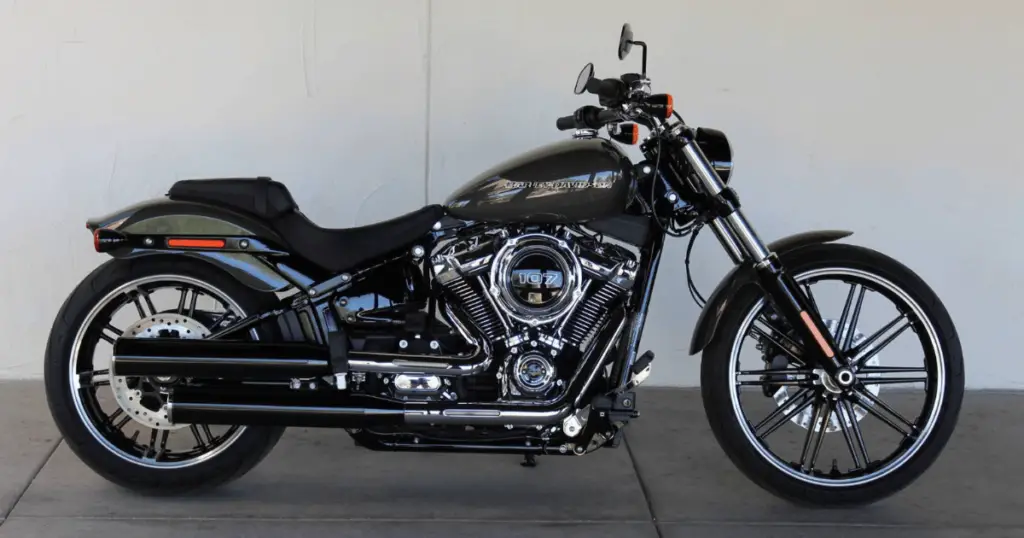When you think of Harley-Davidson, the rich rumble of a powerful engine comes to mind, often it’s the Milwaukee-Eight 107 engine that’s purring beneath the tanks of these iconic bikes. As the heart of the ride, your Harley’s engine significantly impacts your overall experience. The 107, known for its robust performance and relative efficiency, has become a go-to for riders who value reliability without compromising on power.
Understanding whether the 107 is a good engine for your Harley-Davidson comes down to the balance you’re seeking between performance and practicality. This engine, firmly established in the Harley lineup, offers a generous dose of horsepower which translates into a smooth, responsive ride. Its oil-cooled system works hard to maintain the engine’s longevity, keeping you on the road rather than in the maintenance shed. But how do you know if it’s right for you?
Truth is, you’ll have to keep reading to find out. But, keep in mind there are some reported Harley 107 problems that the community has brought to my attention – so you’ll want to hang tight to make sure you’re adequately informed. Let’s roll!
Related read: Harley’s Milwaukee 8 Review: Specs, Problems, and More
Introduction to Harley 107 Specs and More

| Specification | Milwaukee-Eight 107 |
|---|---|
| Displacement | 107 cubic inches (1753cc) |
| Cooling | Oil-cooled cylinder heads |
| Torque | Sufficient for touring and cruising |
When you look under the hood of the Harley-Davidson Milwaukee-Eight 107 engine, you’ll find a balance of power and efficiency. Let’s break down the specifics to understand what makes the 107 engine tick.
Displacement and Power
The Milwaukee-Eight 107 engine comes with a displacement of 1746 cc (107 cubic inches). In terms of power, the 107 is capable of producing about 92.5 horsepower and delivers 111.4 ft-lb of torque at 3250 rpm, providing a robust and smooth ride.
Compression Ratio and Fuel System
Your engine’s compression ratio stands at 10.0:1, which is optimized for performance and fuel efficiency. It is paired with a precise fuel system that ensures that each combustion is as efficient as possible, preserving both power output and fuel economy.
Cooling and Exhaust System
The 107 features a modern cooling system that effectively manages the engine’s temperature, promoting longevity and consistent performance. As for the exhaust system, it is designed to complement the engine’s smooth, powerful characteristics while also meeting emission standards.
Related read: 3 Candidates for The Best Tuner for M8 107 Engines (+Others)
Reliability and Known Harley 107 Problems
When you’re looking at the Harley 107, also known as the Milwaukee 8, you’ll want to consider its reliability and the common issues it may face. From how long the engine lasts to how it manages heat, these insights will help you understand this engine better.
Engine Longevity
The Milwaukee 8, or the Harley 107, has made strides in durability compared to its predecessors. You can expect a solid performance for tens of thousands of miles if it’s maintained properly. Keep in mind though, that some engines have experienced flawed crankshafts, which may lead to costly repairs or a need for a rebuild sooner than expected.
Heat Management Challenges
Harley’s big V-twin engines, including the 107, tend to generate a significant amount of heat. Heat management is a crucial concern that affects both rider comfort and engine longevity. Be aware that the 107 may have heat dispersion issues, particularly during long rides or in heavy traffic, which can potentially impact its performance and durability.
Oil Pump and Fuel Injection Issues
Your Harley 107 utilizes an Electronic Sequential Port Fuel Injection (ESPFI) system, which generally provides a smooth and efficient fuel delivery. However, there have been reported incidents of inconsistent oil pump performance, which can be critical as the oil pump ensures proper lubrication of engine components. Resolving oil pump issues promptly is key to maintaining engine health.
Related read: Harley Oil Sumping Fix: Quick Solutions for a Smooth Ride
Keep these factors in mind as they play a significant role in the overall reliability of the Harley 107. Regular maintenance and immediate attention to any arising problems can mitigate many of the common issues associated with this engine.
Related read: 3 Harley Davidson Fuel Injection Problems To Be Wary Of
Recommendation Maintenance To Avoid Issues Over Time
Maintaining your Harley 107 engine effectively prolongs its lifespan, and there’s a world of options when you’re looking to customize or upgrade. Let’s explore the practical side of upkeep and the exciting realm of personalization.
Routine Maintenance and Cost-effectiveness
Regular maintenance is crucial for keeping your Harley 107 performing at its best. Here’s what you should keep an eye on:
- Oil Changes: Conduct these regularly with quality motorcycle oil to keep the engine running smoothly.
- Air Filter: Replace the air filter according to the service intervals to ensure optimal air flow.
- Cooling System: Check and refresh the coolant periodically, as an efficient cooling system prevents overheating.
Being proactive about maintenance can be highly cost-effective in the long run by avoiding larger, more costly repairs. Your bike’s manual will have a maintenance schedule that’s essential to follow for optimal performance and longevity.
Comparisons With Other Engines
When you’re examining the performance and specifications of the Harley 107 engine, it’s helpful to compare it against its larger cousins, the 114 and 117 engines. This will give you an idea of where the 107 stands in terms of power and capability within the Harley-Davidson lineup.
107 vs. 114 and 117 Engines
Milwaukee-Eight 107
The Milwaukee-Eight 107 engine, with a displacement of 107 cubic inches (1,746 cc), offers solid performance suitable for daily riding. It produces about 92.5 horsepower and has a torque of 111.4 ft-lb at 3,250 rpm. With a compression ratio of 10.0:1, the 107 brings efficiency and reliability.
- Horsepower: ~92.5 HP
- Torque: 111.4 ft-lb
- Compression Ratio: 10.0:1
Milwaukee-Eight 114
In comparison, the Milwaukee-Eight 114 engine steps up with more displacement at 114 cubic inches (1,868 cc). This results in increased horsepower and torque allowing for a stronger and more exhilarating ride.
- Horsepower: Higher than 107
- Torque: More than 107
- Compression Ratio: Typically higher than 107
Related read: Harley 107 vs 114: Specs, Comparisons, and More
Milwaukee-Eight 117
The 117 is the largest of the three, intended for riders looking for maximum power and performance. With even higher displacement and engine refinements, you get the upper echelon of torque and horsepower this lineup can offer.
- Horsepower: Highest among the three
- Torque: Highest among the three
- Compression Ratio: Highest among the three
Now, the 114 and 117 engines are often considered for their superior power, they generally also come with a higher price tag compared to the 107. So, when making your decision, consider how you prioritize cost versus performance.
What Models Have The Harley 107?

Street Glide and Road Glide
The Harley 107 is prominently featured in popular touring motorcycles like the Street Glide and Road Glide. These bikes are renowned for their comfortable ride and long-distance capabilities, with the 107 providing a balance of power and economy.
- Street Glide: The 107 engine equips this model with ample torque for highway cruising and easy acceleration.
- Road Glide: Similarly, the 107 compliments the Road Glide’s aerodynamic design with reliable power for touring.
In different Harley-Davidson models, the 107 serves as a starting point for riders looking to enter the touring category without the need for the maximum power the larger engines offer. It’s the ultimate choice for you if you’re seeking that authentic Harley rumble and dependable performance suitable for an array of riding conditions.
What Does The Community Say About The Harley 107 Engine?
Your fellow riders’ experiences offer valuable insights into what you can expect from the Harley 107 engine. Below, you’ll find organized feedback from various users who share their honest takes based on their riding styles and habits.
User Reviews and Feedback
Power and Performance:
- Many users praise the Milwaukee-Eight 107 engine for its robust power output. Riders looking for a significant upgrade from previous models often report satisfaction with the 107’s performance at high speeds.
- “The torque is instantly noticeable, especially when you’re cruising on the highway,” shares one reviewer, highlighting how the engine responds to the demand for acceleration.
Reliability:
- The consensus is that the 107 engine is a reliable workhorse. Some users note how it confidently handles long rides without any hiccups.
- “I’ve ridden my 107 coast-to-coast, and it hasn’t skipped a beat,” comments a long-distance rider, underlining the engine’s sturdiness over extensive use.
Riding Style Adaptability:
- Whether you’re a daily commuter or a weekend warrior, feedback suggests that the Harley 107 adapts well to various riding habits. Its balanced performance appeals to a wide range of bikers with different riding styles.
- A weekend rider explains, “It’s smooth for a leisurely ride but packs a punch for those spirited moments.” This duality seems to be a highlight for many enthusiasts.
Potential Issues:
- While mostly positive, some reviews point out the occasional mechanical drawbacks, such as issues with the crankshaft, which may impact the longevity of the engine under specific conditions.
- A concerned user advises, “Keep an eye on any unusual sounds or vibrations that may indicate crank trouble, though this isn’t the norm.”
As you sift through user testimonials, remember to consider how their riding preferences align with yours to gauge what your experience might be like with the Harley 107.
Conclusion and My Recommendations
When it comes to Harley-Davidson’s Milwaukee-Eight 107 engine, you’re looking at a powerplant that’s been designed to deliver a solid blend of performance and reliability. As you make your decision, consider the following points:
- Performance: The 107’s oil-cooled system ensures consistent performance. It’s more than capable of providing a pleasurable touring and riding experience, with its generous torque and smooth power delivery.
- Maintenance: With any Harley engine, routine maintenance plays a crucial role in longevity. The 107 is relatively low-maintenance, but regular checks are key to ensuring your ride remains in top condition.
- Economy: If you’re budget-conscious, the Milwaukee-Eight 107 is a cost-effective option, offering a balance of fuel efficiency and power that won’t disappoint.
If you’re after an authentic Harley riding experience without needing the highest power output, the 107 should serve you well. It has enough oomph for highway cruising and provides a classic Harley rumble that is music to the ears of enthusiasts. Consider your riding style and what you expect from your motorcycle to make the best decision for your needs.
Frequently Asked Questions
Your Harley 107 engine is a complex piece of machinery, and you might have questions about its performance, issues, and specifications. Let’s address some of the most common inquiries.
What common issues do Harley 107 engines face?
Many Harley 107 owners have reported instances of oil leaks and overheating. Regular maintenance is key to mitigating these problems and ensuring the longevity of your engine.
How does the reliability of the Milwaukee 8 107 compare to previous models?
The Milwaukee 8 107 engine is known for its enhanced reliability over predecessors like the Harley 96 and 103, due to improvements in cooling and overall design.
What is the horsepower output of the Harley 107 engine?
The Harley 107 engine typically delivers around 92 horsepower to the rear wheel, providing a robust and responsive riding experience.
What are the specifications of a Harley 107 engine?
The Harley 107 engine boasts a displacement of 1,746cc, with a bore of about 100mm and a stroke of 111mm, presenting a balance of power and refinement.




Leave a Reply
You must be logged in to post a comment.